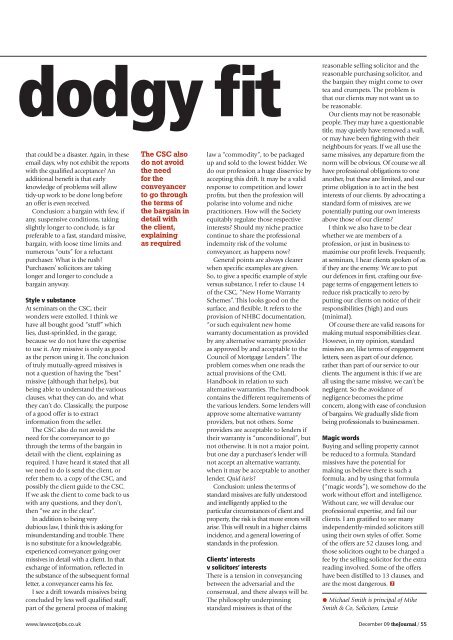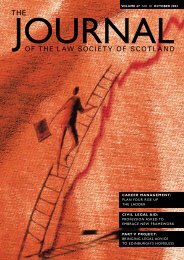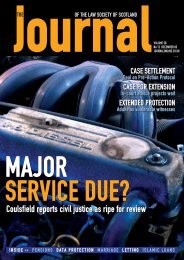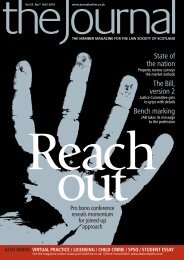Professional briefing - The Journal Online
Professional briefing - The Journal Online
Professional briefing - The Journal Online
Create successful ePaper yourself
Turn your PDF publications into a flip-book with our unique Google optimized e-Paper software.
dodgy fit<br />
that could be a disaster. Again, in these<br />
email days, why not exhibit the reports<br />
with the qualified acceptance? An<br />
additional benefit is that early<br />
knowledge of problems will allow<br />
tidy-up work to be done long before<br />
an offer is even received.<br />
Conclusion: a bargain with few, if<br />
any, suspensive conditions, taking<br />
slightly longer to conclude, is far<br />
preferable to a fast, standard missive,<br />
bargain, with loose time limits and<br />
numerous “outs” for a reluctant<br />
purchaser. What is the rush?<br />
Purchasers’ solicitors are taking<br />
longer and longer to conclude a<br />
bargain anyway.<br />
Style v substance<br />
At seminars on the CSC, their<br />
wonders were extolled. I think we<br />
have all bought good “stuff” which<br />
lies, dust-sprinkled, in the garage,<br />
because we do not have the expertise<br />
to use it. Any missive is only as good<br />
as the person using it. <strong>The</strong> conclusion<br />
of truly mutually-agreed missives is<br />
not a question of having the “best”<br />
missive (although that helps), but<br />
being able to understand the various<br />
clauses, what they can do, and what<br />
they can’t do. Classically, the purpose<br />
of a good offer is to extract<br />
information from the seller.<br />
<strong>The</strong> CSC also do not avoid the<br />
need for the conveyancer to go<br />
through the terms of the bargain in<br />
detail with the client, explaining as<br />
required. I have heard it stated that all<br />
we need to do is send the client, or<br />
refer them to, a copy of the CSC, and<br />
possibly the client guide to the CSC.<br />
If we ask the client to come back to us<br />
with any questions, and they don’t,<br />
then “we are in the clear”.<br />
In addition to being very<br />
dubious law, I think this is asking for<br />
misunderstanding and trouble. <strong>The</strong>re<br />
is no substitute for a knowledgeable,<br />
experienced conveyancer going over<br />
missives in detail with a client. In that<br />
exchange of information, reflected in<br />
the substance of the subsequent formal<br />
letter, a conveyancer earns his fee.<br />
I see a drift towards missives being<br />
concluded by less well qualified staff,<br />
part of the general process of making<br />
www.lawscotjobs.co.uk<br />
<strong>The</strong> CSC also<br />
do not avoid<br />
the need<br />
for the<br />
conveyancer<br />
to go through<br />
the terms of<br />
the bargain in<br />
detail with<br />
the client,<br />
explaining<br />
as required<br />
law a “commodity”, to be packaged<br />
up and sold to the lowest bidder. We<br />
do our profession a huge disservice by<br />
accepting this drift. It may be a valid<br />
response to competition and lower<br />
profits, but then the profession will<br />
polarise into volume and niche<br />
practitioners. How will the Society<br />
equitably regulate those respective<br />
interests? Should my niche practice<br />
continue to share the professional<br />
indemnity risk of the volume<br />
conveyancer, as happens now?<br />
General points are always clearer<br />
when specific examples are given.<br />
So, to give a specific example of style<br />
versus substance, I refer to clause 14<br />
of the CSC, “New Home Warranty<br />
Schemes”. This looks good on the<br />
surface, and flexible. It refers to the<br />
provision of NHBC documentation,<br />
“or such equivalent new home<br />
warranty documentation as provided<br />
by any alternative warranty provider<br />
as approved by and acceptable to the<br />
Council of Mortgage Lenders”. <strong>The</strong><br />
problem comes when one reads the<br />
actual provisions of the CML<br />
Handbook in relation to such<br />
alternative warranties. <strong>The</strong> handbook<br />
contains the different requirements of<br />
the various lenders. Some lenders will<br />
approve some alternative warranty<br />
providers, but not others. Some<br />
providers are acceptable to lenders if<br />
their warranty is “unconditional”, but<br />
not otherwise. It is not a major point,<br />
but one day a purchaser’s lender will<br />
not accept an alternative warranty,<br />
when it may be acceptable to another<br />
lender. Quid iuris?<br />
Conclusion: unless the terms of<br />
standard missives are fully understood<br />
and intelligently applied to the<br />
particular circumstances of client and<br />
property, the risk is that more errors will<br />
arise. This will result in a higher claims<br />
incidence, and a general lowering of<br />
standards in the profession.<br />
Clients’ interests<br />
v solicitors’ interests<br />
<strong>The</strong>re is a tension in conveyancing<br />
between the adversarial and the<br />
consensual, and there always will be.<br />
<strong>The</strong> philosophy underpinning<br />
standard missives is that of the<br />
reasonable selling solicitor and the<br />
reasonable purchasing solicitor, and<br />
the bargain they might come to over<br />
tea and crumpets. <strong>The</strong> problem is<br />
that our clients may not want us to<br />
be reasonable.<br />
Our clients may not be reasonable<br />
people. <strong>The</strong>y may have a questionable<br />
title, may quietly have removed a wall,<br />
or may have been fighting with their<br />
neighbours for years. If we all use the<br />
same missives, any departure from the<br />
norm will be obvious. Of course we all<br />
have professional obligations to one<br />
another, but these are limited, and our<br />
prime obligation is to act in the best<br />
interests of our clients. By advocating a<br />
standard form of missives, are we<br />
potentially putting our own interests<br />
above those of our clients?<br />
I think we also have to be clear<br />
whether we are members of a<br />
profession, or just in business to<br />
maximise our profit levels. Frequently,<br />
at seminars, I hear clients spoken of as<br />
if they are the enemy. We are to put<br />
our defences in first, crafting our fivepage<br />
terms of engagement letters to<br />
reduce risk practically to zero by<br />
putting our clients on notice of their<br />
responsibilities (high) and ours<br />
(minimal).<br />
Of course there are valid reasons for<br />
making mutual responsibilities clear.<br />
However, in my opinion, standard<br />
missives are, like terms of engagement<br />
letters, seen as part of our defence,<br />
rather than part of our service to our<br />
clients. <strong>The</strong> argument is this: if we are<br />
all using the same missive, we can’t be<br />
negligent. So the avoidance of<br />
negligence becomes the prime<br />
concern, along with ease of conclusion<br />
of bargains. We gradually slide from<br />
being professionals to businessmen.<br />
Magic words<br />
Buying and selling property cannot<br />
be reduced to a formula. Standard<br />
missives have the potential for<br />
making us believe there is such a<br />
formula, and by using that formula<br />
(“magic words”), we somehow do the<br />
work without effort and intelligence.<br />
Without care, we will devalue our<br />
professional expertise, and fail our<br />
clients. I am gratified to see many<br />
independently-minded solicitors still<br />
using their own styles of offer. Some<br />
of the offers are 52 clauses long, and<br />
those solicitors ought to be charged a<br />
fee by the selling solicitor for the extra<br />
reading involved. Some of the offers<br />
have been distilled to 13 clauses, and<br />
are the most dangerous.<br />
Michael Smith is principal of Mike<br />
Smith & Co, Solicitors, Lenzie<br />
December 09 the<strong>Journal</strong> / 55










